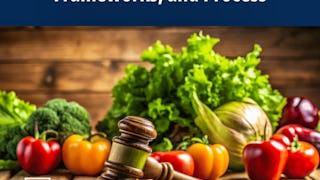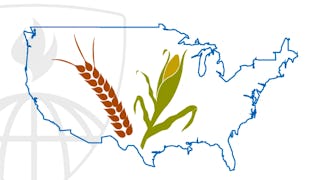In today’s global food system, understanding how food regulations shape what we eat, how it’s labeled, and how it’s imported is more important than ever. Navigating U.S. Food Regulations: Safety and Enforcement is a dynamic 4-week Coursera course that explores the complex landscape of U.S. food laws, enforcement mechanisms, and the role of advocacy in shaping policy. From the Food Safety Modernization Act (FSMA) to the regulation of dietary supplements and infant formula, learners will gain a practical understanding of how food safety is maintained and how consumer protection is enforced. Led by instructor Dr. Jessica Hartke, you’ll explore how regulations evolve in response to public health needs and industry practices.



Expérience recommandée
Compétences que vous acquerrez
- Catégorie : Regulatory Affairs
- Catégorie : Good Manufacturing Practices
- Catégorie : Litigation and Civil Justice
- Catégorie : Food and Beverage
- Catégorie : Food Safety and Sanitation
- Catégorie : Packaging and Labeling
- Catégorie : Law, Regulation, and Compliance
- Catégorie : Nutrition and Diet
- Catégorie : Public Policies
- Catégorie : Food Quality Assurance And Control
- Catégorie : Advocacy
- Catégorie : Advertising
- Catégorie : Regulatory Compliance
Détails à connaître

Ajouter à votre profil LinkedIn
août 2025
6 devoirs
Découvrez comment les employés des entreprises prestigieuses maîtrisent des compétences recherchées

Il y a 4 modules dans ce cours
In the course orientation, you'll get to know the course, your classmates, and our learning environment, and gain the technical skills needed. Then, learn how advocacy groups influence food policy and regulation in the U.S. You will also learn how global organizations and U.S. agencies work together to ensure that imported foods meet safety and labeling standards. By the end of this module, you'll be able to explain how both domestic and international efforts help shape the food supply available to U.S. consumers.
Inclus
9 vidéos5 lectures2 devoirs1 sujet de discussion
In this module, you will learn how the U.S. regulates special categories of foods, including medical foods, infant formula, and dietary supplements. These products serve unique roles in health and nutrition and are subject to specific rules for safety, labeling, and ingredient use. You’ll explore how key laws like the Infant Formula Act and the Dietary Supplement Health and Education Act (DSHEA) define these categories and guide FDA oversight. By the end of this module, you’ll be able to identify how each of these special foods is regulated and what makes them different from conventional foods.
Inclus
8 vidéos2 lectures1 devoir
In this module, you will learn how food regulations are enforced in the U.S. through the work of key federal agencies like the FDA and USDA. You’ll explore the difference between labeling and advertising and understand why each is regulated differently. The module also covers enforcement tools such as recalls, withdrawals, safety alerts, and FDA warning letters. By the end of this module, you’ll be able to explain how enforcement actions help protect consumers and ensure companies follow food laws.
Inclus
10 vidéos2 lectures1 devoir
In this module, you will explore how food regulations are enforced through real-world examples and learn how consumers can take legal action when regulations fall short. You’ll examine case studies involving mislabeled or unsafe products and understand the role of private litigation and class-action lawsuits in protecting consumer rights. At the conclusion of this module, you will be ready to complete the final assessment for the course and earn your Coursera certificate!
Inclus
7 vidéos6 lectures2 devoirs
Obtenez un certificat professionnel
Ajoutez ce titre à votre profil LinkedIn, à votre curriculum vitae ou à votre CV. Partagez-le sur les médias sociaux et dans votre évaluation des performances.
Instructeur

Offert par
En savoir plus sur Nutrition
 Statut : Prévisualisation
Statut : PrévisualisationUniversity of Illinois Urbana-Champaign
 Statut : Prévisualisation
Statut : PrévisualisationUniversity of Illinois Urbana-Champaign
 Statut : Prévisualisation
Statut : PrévisualisationCoursera Instructor Network
 Statut : Prévisualisation
Statut : PrévisualisationJohns Hopkins University
Pour quelles raisons les étudiants sur Coursera nous choisissent-ils pour leur carrière ?





Ouvrez de nouvelles portes avec Coursera Plus
Accès illimité à 10,000+ cours de niveau international, projets pratiques et programmes de certification prêts à l'emploi - tous inclus dans votre abonnement.
Faites progresser votre carrière avec un diplôme en ligne
Obtenez un diplôme auprès d’universités de renommée mondiale - 100 % en ligne
Rejoignez plus de 3 400 entreprises mondiales qui ont choisi Coursera pour les affaires
Améliorez les compétences de vos employés pour exceller dans l’économie numérique
Foire Aux Questions
Yes! Although completion of the Coursera course alone is not credit-bearing, it is a required component of a graduate-level Canvas course that can be "stacked" toward advanced credentials such as an academic (transcriptable) graduate certificate or a degree. If you decide to pursue further education, the credits you earn from this course can be applied toward a formal academic program, provided that you meet all the requirements of admission to the certificate or degree.
To access the course materials, assignments and to earn a Certificate, you will need to purchase the Certificate experience when you enroll in a course. You can try a Free Trial instead, or apply for Financial Aid. The course may offer 'Full Course, No Certificate' instead. This option lets you see all course materials, submit required assessments, and get a final grade. This also means that you will not be able to purchase a Certificate experience.
When you purchase a Certificate you get access to all course materials, including graded assignments. Upon completing the course, your electronic Certificate will be added to your Accomplishments page - from there, you can print your Certificate or add it to your LinkedIn profile.
Plus de questions
Aide financière disponible,


